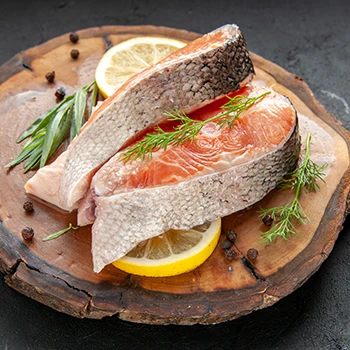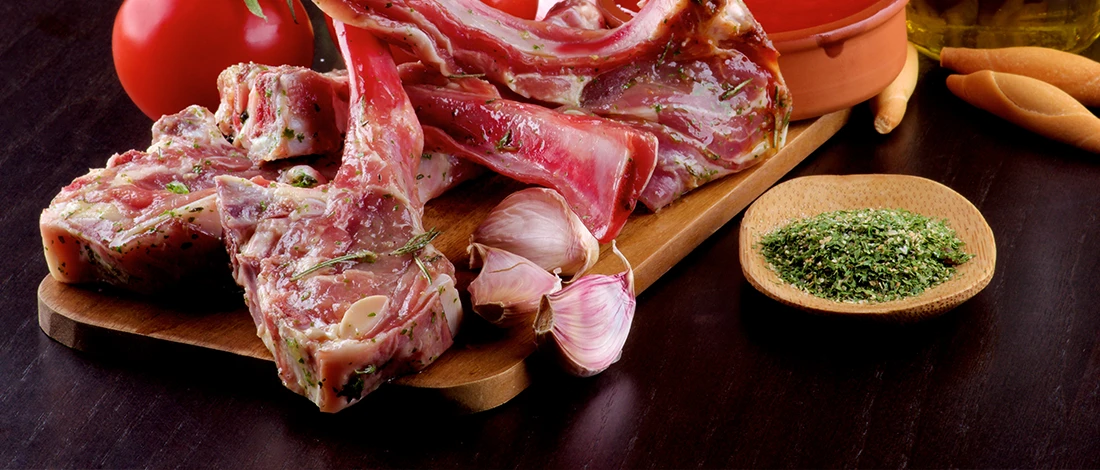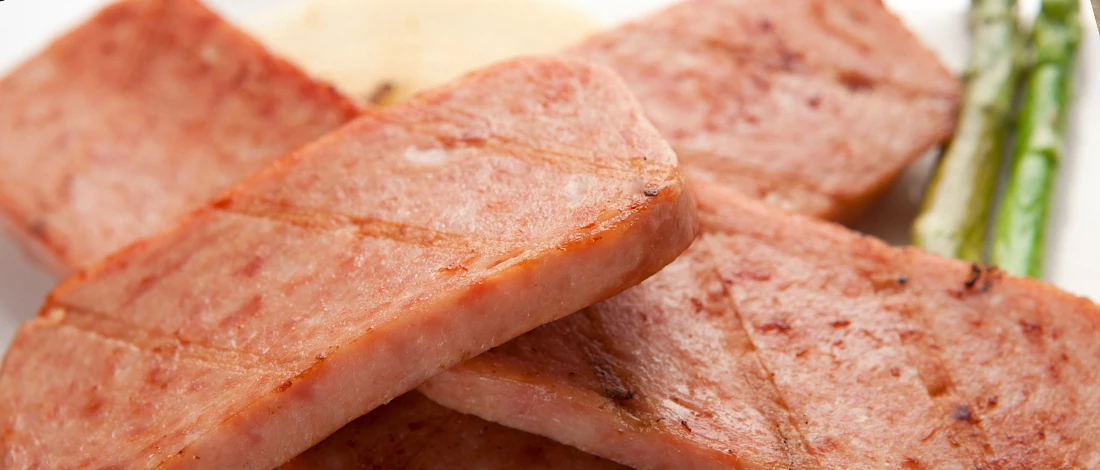As a seasoned nutritionist with years of hands-on experience and a deep commitment to promoting a healthy lifestyle, I've dedicated substantial time to exploring a question that often sparks debate: Is fish considered meat?
The answer to whether fish is meat isn’t clear-cut and depends on factors such as religion, dietary preferences, etc.
I talked with people of different religions and dietitians and studied the food pyramid and how it evolved.
This comprehensive article will, therefore, investigate whether fish qualifies as meat and uncover the health benefits.
If you’re a seafood lover, you need a reliable source of quality fish. ButcherBox sells scallops, lobster, cod, halibut, and more.
Quick Summary
- Whether fish is considered meat depends on definitions, religious beliefs, and dietary preferences.
- Both fish and meat are necessary for a healthy diet, but fish is healthier than meat because it doesn’t have saturated fat.
- Vegans don’t eat animal flesh, including fish, but some vegetarians do.
Is Fish Considered Meat?
Fish is considered meat, but also, no, fish isn’t considered meat. This depends on how you define meat and on your religion.
Meat Definition

Meat is defined as the flesh of animals used for food [1]. If we follow this definition, fish is meat.
But, some people distinguish between warm-blooded animals, such as chickens, pigs, sheep, and cows, and cold-blooded animals, such as fish. If you follow this distinction, then fish isn’t meat.
The term meat is also used exclusively for fur-covered mammals, excluding fish, and means fish isn’t meat.
However, most dictionaries define meat as the flesh of animals, so fish is meat. American Meat Science Association defines meat as all skeletal muscle and tissues from land and marine animals.
“Meat is defined by AMSA to be skeletal muscle and its associated tissues derived from mammalian, avian, reptilian, amphibian, and aquatic species commonly harvested for human consumption. Edible offal consisting of organs and non-skeletal muscle tissues also are considered meat.”
- A Perspective from the American Meat Science Association, Journal Article
Fish is meat, according to science. Science says meat is made up of water, animal protein, and fat and is edible raw but should be eaten after cooking. So fish also falls under this definition.
Religion

Different religions have different views on whether fish is meat.
Muslim
Muslims have strict dietary rules and different categories for meat and fish. There are also rules about meat handling. If a fish has scales, it’s considered halal meat and allowed.
Most Muslims don’t eat crustaceans because they don’t have scales. Also, fish without scales, such as shellfish and octopus, aren’t allowed.
Jewish
Judaism makes a difference between meat and fish. For example, they can’t be eaten together.
Only fish with fins and scales are allowed in Judaism, which means no shellfish.
Fish with fins and scales is called pareve and isn’t considered meat.
Hindu
Different Hindu groups have rules about fish. Some see it as meat, and it’s allowed. However, most Hindu texts recommend ahimsa, which is non-violence against all life forms, which means no fish.
Overall, those Hindus that eat meat distinguish between beef and pork on the one hand and fish on the other [2].
Christian
Christianity has the most casual rules on meat and fish. The only time Christians aren’t allowed to consume meat is during Lent. However, some Christians eat fish during Lent because they don’t consider it meat.
Bible says Christians can eat any fish with fins and scales. Some Christians fast on Friday because that’s the day Christ died on. They interpret this to mean they shouldn’t eat meat from warm-blooded animals, but fish is allowed because it’s cold-blooded.
Buddhism
Buddhism doesn’t have specific dietary restrictions, but there are some principles that should be followed.
Most Buddhists are lacto-vegetarians, which means they eat dairy and animal products, but no meat or fish.
Fish Health Benefits

Fish is a source of protein, selenium, and vitamin D, nurturing several health benefits.
The health benefits of fish are:
- Lower blood pressure
- Lower triglycerides
- Lower risk of heart disease
- Good for brain health
Fish is also very rich in Omega-3 fatty acids, which can keep our heart and brain healthy and prevent inflammation and the risk of arthritis [3].
Salmon, trout, sardines, light tuna, and oysters are excellent sources of Omega-3 acids.
It’s recommended to eat at least two portions of fish a week [4]. One of those should be oily fish because it’s rich in Omega 3s.
Both fish and meat have health benefits, but meat is high in saturated fat, which is a bad kind of fat.
One study found that eating meat, especially red meat, leads to a higher risk of heart disease, but eating fish was a lower risk. Overall, eating fish is healthier than eating meat [5].
“Eating about 2 grams per week of omega-3 fatty acids in fish, equal to about one or two servings of fatty fish a week, reduces the chances of dying from heart disease by more than one-third.”
- Harvard T. H. Chan, School of Public Health
Food Pyramid
A look at how the food pyramid changed over time helps us see how views on fish and meat changed as well:
- The 1940s — We didn’t have a food pyramid but a wheel. Meat, fish, eggs, peas, nuts, and peanut butter were all listed as sources of protein.
- 1974 — No more wheel, but we have a food pyramid. Nothing changed in meat and food classification.
- 1992 — Food pyramid was updated. Meat, fish, eggs, poultry, and nuts were shown as choices for protein.
- 2005 — Another food pyramid update. Meat and beans were the only protein choices.
- 2011 — Invention of “My Plate” paired with “My Pyramid.” It groups together vegetables, nuts, beans, fish, and chicken as healthy proteins (but no red meat).
Overall, meat and fish were in the same category for a long time. Then we had a trend where meat and fish weren’t viewed as the same, but all protein sources were equal.
Dietary Guidelines

Apart from different religions and beliefs, people have dietary guidelines that do or don’t allow them to consume fish.
For example, there are different versions of a vegetarian diet. Most of them have a ban on meat. However, many vegetarians eat fish, which tells us they don’t see fish as meat.
On the other hand, vegans abstain from all animal products, which include meat, fish, eggs, honey, dairy, and more.
There are also pescatarians. A pescatarian diet is a type of vegetarianism that eliminates chicken meat and red meat and sees seafood as a meat source.
Pescetarians believe fish and seafood have nervous systems that are less complex than red meat, so it’s ethical to kill them to eat.
The reasoning is that fish have little brainpower, so they may not even feel pain when slaughtered, so pescatarians eat fish instead of beef or pork. However, this isn’t true, as it’s proven fish feel pain [6].
Finally, a flexitarian diet allows eating fish and red meats occasionally.
Whether fish is considered meat depends on religion, definition, dietary guidelines, and more.
Related Articles:
FAQs
Why is Fish not Considered Meat?
Fish is not considered meat because it’s a cold-blooded animal. Some religions only consider meat from animals that live on land, such as pigs, cows, and chickens.
Is Fish a Meat in the Bible?
Fish isn’t meat in the Bible. Fish is separated from the flesh of man, beast, and bird in the Bible. This is why fish is allowed to be consumed during Lent.
What Do We Call Fish Meat?
We call fish meat because we often give the same name to the animal and its meat. For example, tuna meat is called tuna, salmon meat is called salmon, and lobster meat is called lobster.
Is Fish Considered Meat to a Vegetarian?
Fish is considered meat to a vegetarian because fish and seafood are animal flesh, just like other meats. However, some vegetarians, such as pescatarians, consume fish.
Why is Fish not Vegan?
Fish is not vegan because veganism excludes the consumption of sentient animals, which includes fish.
Why is Fish Different from Meat?
Fish is different from meat because it has shorter muscle fibers and less connective tissue than meat. Fish connective tissue is more sensitive than meat and is placed differently. Connective tissues in fish lie in thin sheets that separate muscle fibers.
References:
- https://www.dictionary.com/browse/meat
- https://pubmed.ncbi.nlm.nih.gov/24898226/
- https://doh.wa.gov/community-and-environment/food/fish/health-benefits#
- https://www.heart.org/en/healthy-living/healthy-eating/eat-smart/
- https://pubmed.ncbi.nlm.nih.gov/20713902/
- https://www.peta.org/issues/animals-used-for-food/factory-farming/fish/fish-feel-pain/








